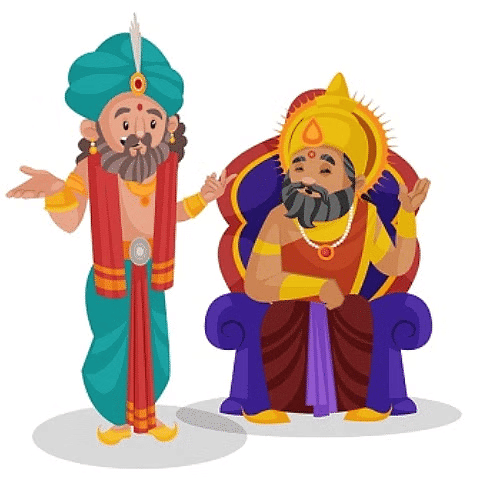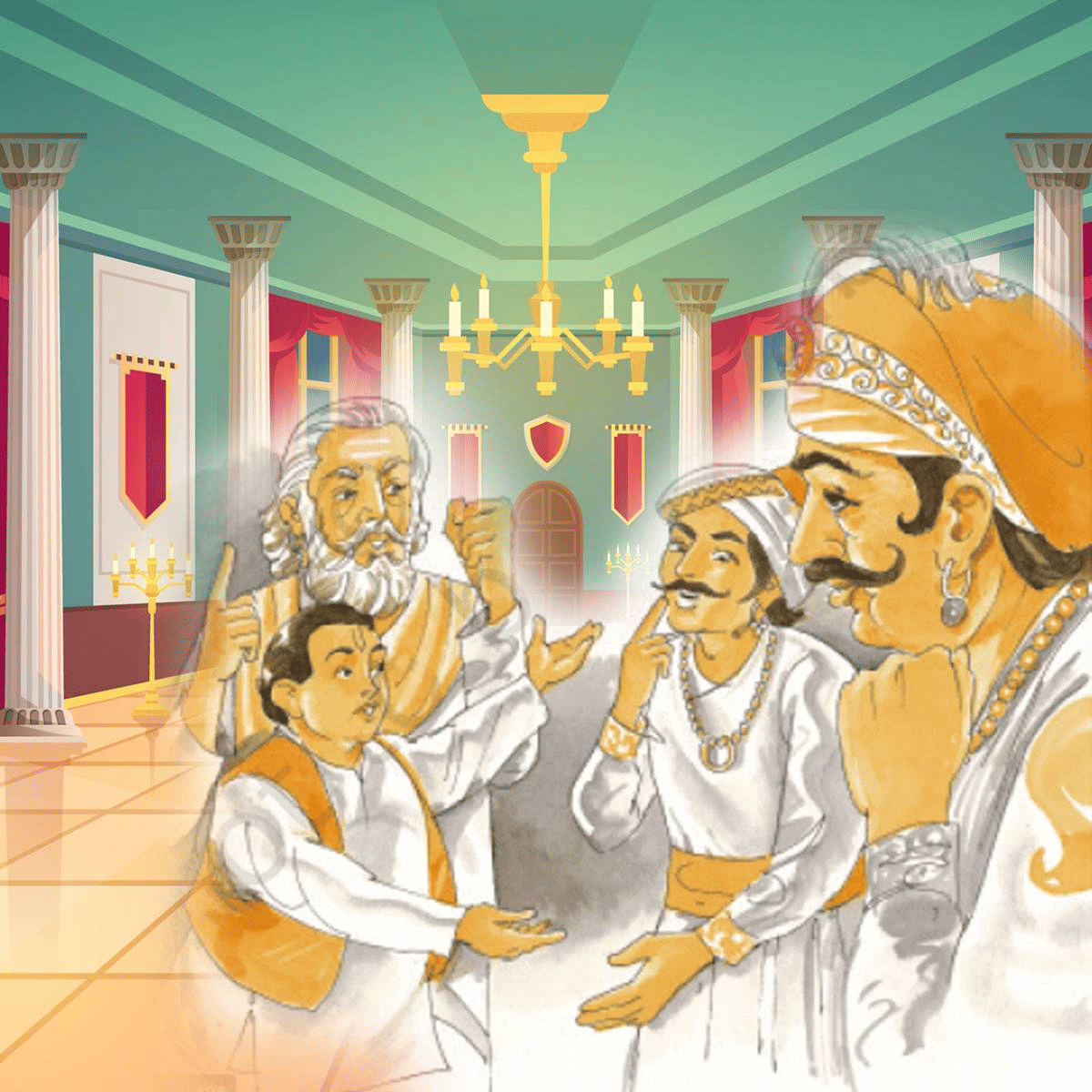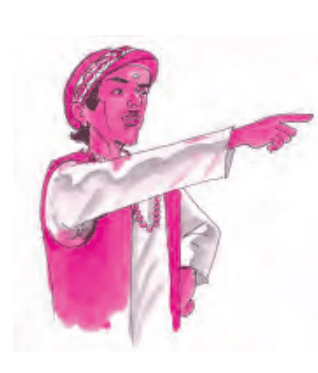In the Kingdom of Fools Summary Class 9 English Moments Chapter 4
| Table of contents |

|
| Introduction |

|
| Key Points of the Story |

|
| Detailed Summary |

|
| Theme & Message |

|
| Difficult Words |

|
Introduction
"In the Kingdom of Fools" is a humorous folktale that tells the story of a strange kingdom where the king and his minister make foolish decisions, turning day into night and night into day. The tale explores how their silly rules lead to chaos, showing the dangers of foolishness and the power of wisdom.
This story is a Kannada folktale, retold by A.K. Ramanujan in his book Folk Tales from India. A.K. Ramanujan was a renowned Indian poet, scholar, and folklorist. He collected and translated folktales from various Indian languages, preserving the rich oral traditions of India.
Key Points of the Story
- The king and his minister make an odd rule in the Kingdom of Fools—day becomes night, and night becomes day, and everyone must follow this schedule.
- A guru and his disciple visit the kingdom. The guru senses danger and leaves quickly, but the disciple stays, attracted by the cheap food and low prices.

- A thief dies when a wall collapses on him during a robbery. The blame shifts from one person to another, including a merchant, a bricklayer, a dancer, a goldsmith, and the merchant’s father.
- The disciple is chosen for execution because he has gained weight and fits the stake. He regrets staying in the kingdom and ignoring his guru’s advice.
- The guru returns to save his disciple. He tricks the king and minister into believing they will be reborn as rulers if they are executed first, leading to their downfall.
- After the king and minister’s death, the people make the guru and disciple the new leaders. They bring wisdom and fairness to the kingdom.
Detailed Summary
Once upon a time, there was a strange kingdom where the king and his minister were foolish. They decided to run their kingdom differently from others. They ordered that people should work at night and sleep during the day. Anyone who disobeyed would be punished with death. The people, afraid of punishment, followed these odd rules.

One day, a wise guru and his disciple came to this kingdom. They were surprised to see no one around during the day. Even the animals slept. At night, the city came alive. When they went to buy food, they discovered that everything cost the same—just one duddu. The disciple was thrilled because food was so cheap, but the guru warned him that living among fools was risky. Despite the guru’s advice to leave, the disciple decided to stay and enjoy the cheap food. The guru left, saying, "You’ll regret this decision."
Time passed, and the disciple grew fat from eating too much. One day, a thief broke into a merchant’s house, but the weak wall collapsed and killed him. The thief’s brother complained to the king, blaming the merchant for the poor wall. The king decided to deliver justice in his own foolish way. The blame passed from the merchant to the bricklayer who built the wall, then to a dancing girl who distracted the bricklayer, and finally to a goldsmith who delayed the girl, forcing her to walk by the bricklayer. Eventually, the blame returned to the merchant whose father had commissioned the jewellery long ago.
The king decided the merchant must be punished but found him too thin for the execution stake. He ordered his servants to find a fat man instead. The disciple, now plump, was chosen. Realizing his life was in danger, he prayed to his guru for help. The guru, with his wisdom and magical powers, returned to save him.
The guru devised a clever plan. He told the king that whoever was executed first on the stake would be reborn as the king in their next life, and the second would become the minister. The greedy king and minister, eager to retain their positions, decided to take the guru and disciple’s places. That night, the foolish king and minister were executed.
The people were left without rulers and begged the guru and his disciple to govern them. The guru agreed on the condition that the strange laws would be abolished. From then on, the kingdom returned to normal, with people working during the day and sleeping at night. Prices were no longer absurd, and the guru and his disciple ruled wisely.

Theme & Message
Theme
The story highlights the contrast between wisdom and foolishness, showing how foolish leaders can create chaos. It also emphasizes the importance of good sense and logical decisions in governance.
Message
Wisdom wins over foolishness: The guru’s cleverness saves the day, proving that smart thinking can solve even the toughest problems.
Foolishness is dangerous: Living among fools is risky because their actions are unpredictable and harmful.
Leaders need logic: Good rulers make fair and sensible decisions to ensure justice and stability.
Greed leads to trouble: The king and minister’s greed for power causes their downfall.
Be practical and adapt: The guru’s ability to adapt and bring change shows the value of flexibility in life.
Difficult Words
- Accuse - To say that someone has done something wrong or illegal.
- Bailiff - A law officer who ensures that court decisions are followed.
- Bricklayer - Someone whose job is to build things with bricks.
- Burglar - A person who illegally enters buildings to steal things.
- Clamour - To demand something loudly.
- Compensate - To give someone something, usually money, for loss or damage.
- Complicate - To make something more difficult to understand or deal with.
- Criminal - A person who has done something against the law.
- Decisively - Doing something in a way that shows confidence and clear choices.
- Decree - An official order by someone in power.
- Delight - A strong feeling of happiness.
- Distracted - Not able to pay attention because you're thinking of something else.
- Execution - The act of killing someone as a legal punishment.
- Fragile - Easily broken or damaged.
- Goldsmith - A person who makes things out of gold.
- Guilty - Having done something wrong or illegal.
- Highness - A title used for someone of royal rank.
- Impaling - To stick a sharp object through something.
- Impatient - Not willing to wait for something or someone.
- Injustice - When things aren't fair or just.
|
180 videos|975 docs|124 tests
|
FAQs on In the Kingdom of Fools Summary Class 9 English Moments Chapter 4
| 1. What is the main plot of "In the Kingdom of Fools"? |  |
| 2. Who are the main characters in "In the Kingdom of Fools"? |  |
| 3. What is the moral lesson of "In the Kingdom of Fools"? |  |
| 4. How does the setting of the kingdom contribute to the story's theme? |  |
| 5. What are some difficult words found in "In the Kingdom of Fools"? |  |
















